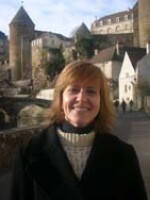AUDIE CORNISH, HOST:
In France, mainstream political parties are alarmed over the success of the far-right in regional elections underway. In some regions, the National Front took more than 40 percent of the vote Sunday, and the party could take control of those regions after the second round of voting this Sunday. NPR's Eleanor Beardsley sends this report from Marseille.
ELEANOR BEARDSLEY, BYLINE: Customers gather around a fish stall in the bustling port city of Marseille. Oysters, shrimp and glassy-eyed fish are laid out on ice. This is France's second-largest city. Around a quarter of the population is Muslim, and it's a stronghold of the far-right. Retiree Bernadette Gira, who used to vote for the mainstream right, says she'll be thrilled if the National Front takes this region on Sunday.
BERNADETTE GIRA: (Through interpreter) We are sick of the socialists and the conservatives. They just change back and forth between each other, and nothing changes. So why not try something new? I would like for things to be like they used to be, when people could go out in the street and feel secure and earn a good living.
BEARDSLEY: Gira says if Hollande had been doing his job, France wouldn't have been attacked by terrorists last month. Briac de Musset is behind the counter. The young fishmonger says he's also open to trying the National Front.
BRIAC DE MUSSET: (Through interpreter) The traditional political parties aren't interested in the working-class, or even the middle class, really. They're just using them to continue their bourgeois politics and stay in power.
BEARDSLEY: The National Front came in first place among French blue-collar workers last weekend. The French far-right advocates strong worker protections, long-term unemployment benefits and a nationalist trade policy.
(SOUNDBITE OF ARCHIVED RECORDING)
MARION MARECHAL-LE PEN: (Speaking French).
BEARDSLEY: Speaking at a rally this week in Marseille, the National Front's main candidate for this region, Marion Marechal-Le Pen, outlined her program of patriotic protection for local companies. She won applause when she denigrated multinational corporations. The 26-year-old politician is the granddaughter of the National Front's founder, Jean-Marie Le Pen. It was her aunt, current party leader Marine Le Pen, who transformed the National Front from a fringe party of the extreme-right to a real political alternative for many French voters.
NONNA MAYER: The idea that the right was in office, the left was in office, they govern together, and look, they haven't managed to solve the problem number one, which is not terrorists, which is unemployment. So she is surfing on that wave of anti-elite, anti-terrorism, anti-immigrants mood, and she's done it very skillfully.
EVA TAHLA: (Speaking French).
BEARDSLEY: Eva Tahla was a socialist candidate from Marseille's regional council, but her party did so poorly in first-round voting last Sunday that it's dropped out of the election altogether and is asking its supporters to back mainstream conservative candidates and block the National Front. Twenty-six-year-old Tahla says she's particularly concerned by young people who support Le Pen.
TAHLA: (Through interpreter) This generation is really hit by unemployment. Young people are looking for answers. We've had the left and the right in power and still haven't found any.
BEARDSLEY: Tahla says, in 1968, disillusioned French students revolted and turned to the left. Today, she says, young people are either apathetic or falling into the embrace of the far-right. Eleanor Beardsley, NPR News, Marseille. Transcript provided by NPR, Copyright NPR.



